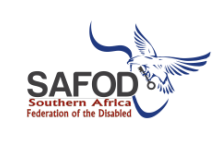Strengthening of the Regional Response Strategy for COVID-19 for Persons with Disabilities in Southern Africa
by Southern Africa Federation of the Disabled (SAFOD)As of April 1st, 2020, SAFOD had just completed developing a regional Response Strategy for the on COVID-19 for persons with disabilities in Southern Africa. What started as an epidemic limited primarily to China sometime in December 2019 has now rapidly grown a global pandemic. The disease has affected everyone, directly or indirectly; it is affecting the health and socioeconomic status of people in both developed and developing countries alike. People with different forms of disabilities, for obvious reasons, are not been spared.
SAFOD, which is the umbrella network of national federation of organizations of persons with disabilities in ten countries, currently works in Angola, Botswana, Eswatini, Lesotho, Malawi, Mozambique, Namibia, South Africa, Zambia and Zimbabwe. A response strategy to address potential effects on persons with disabilities in this crisis is not a matter choice. It is a matter of urgency.
As the Southern Africa Development Community (SADC) countries prepare for strategic multi-stakeholder responses, there are few facts that are currently known affecting persons with disabilities, which have helped to inform the SAFOD’s response strategy. They include:
1. Most Governments in Southern Africa were taken unawares, as a result they are no sufficient funding/resources to address the epidemic especially if it continues to rise. The fear is that if the situation overwhelmed bigger economies like Spain and Italy, chances are that the situation might likely be even frighteningly worse in resource-constrained SADC nations.
2. Of all the preventative and safety information related to COVID-19 so far being shared, none is yet available in accessible formats such as Braille, sign language, large text, etc.
3. There are no specific stand-alone strategies/plans/etc. targeting persons with disabilities even though there are efforts to broadly mainstream disability – at rhetorical/political level – in some of the national response strategies. How such rhetoric is translated into action on the ground remains to be seen.
4. Involvement of persons with disabilities themselves in national response planning efforts has so far been very insignificant.
However, the following critical issues affecting persons with disabilities remain unclear at present, in the absence of any empirical data/research on the ground:
1. Estimates of persons with disabilities already infected and/or affected by the coronavirus within communities, disaggregated by sex and type of disability.
2. Estimates of persons with disabilities at risk of being infected and/or affected by the coronavirus within communities, disaggregated by sex and type of disability.
3. The other challenges being faced by persons with disabilities in accessing health services related to Covid-19, besides inaccessible information related to Covid-19,
4. Other current needs beyond accessible information related to Covid-19 with respect to persons with disabilities in communities.
5. Specific best practices – if available – of disability mainstreaming efforts in national response strategies/plans at all levels – community level, policy level, political level, etc. – on Covid-19 that can be scaled across the region.
Based on what is currently known already, this response strategy proposes a list of interventions targeting persons with disabilities and their carers through our national affiliates who constitute federations of Disabled People’s Organizations (DPOs) in the countries we work.
However, recognizing that there are still quite a lot of significant information that we need to learn at this early stage, SAFOD will continue updating the response strategy, to incorporate some kind of a baseline data. Hence part of the support that we are seeking - whether it is through volunteer work or financial funding - is towards helping us to effectively conduct a data collection and analysis exercise on a consistent basis to enable us to update this response strategy and make remain as relevant possible for millions of of persons with disabilities in the region. This data is most likely to be collected through desk research, online interviews through Skype, online focus groups discussions using teleconferencing platforms, online questionnaire, etc.
The main goal of this regional response strategy is to support SAFOD's national affiliates and other key stakeholders at national levels in the development of effective and inclusive national response strategies that are focused on reducing infection and impact of COVID-19 among persons with disabilities in Southern Africa.
The specific objectives include:
1. To generate and utilize already existing knowledge, evidence and data from research studies, case studies (good practices), etc. related to inclusive responses against COVID-19 for purposes of documentation, shared learning, disability programming, monitoring and evaluation.
2. To engage and influence SADC and its member states to develop/integrate disability inclusive national response plans on COVID-19.
3. To increase the capacity of SAFOD’s national affiliate federations of DPOs in ensuring their effectiveness and sustainability in promoting and securing implementation of inclusive interventions on COVID-19.
4. To increase awareness through sensitization and capacity building of DPOs, SADC, Government Departments, Development partners, Civil Society Organisations, Private Sector and the media on inclusive plans, programs and interventions that address COVID-19 and related issues concerning persons with disabilities.
5. To advocate for mainstreaming of disability into health services and programs ensuring increased access to quality health services related to COVID-19 by Persons with Disabilities.
6. To increase and diversify the funding for implementation of this Response Strategy through fundraising and strategic partnerships with various stakeholders, including international development partners, Governments, the private sector, communities, crowd-funding, and individual well-wishers.
7. To strengthen governance, administration and deepen accountability within SAFOD Secretariat and our national affiliates (who are likely going to be sub-grantees) to deliver quality and impactful interventions guided by this Response Strategy.
This zero-draft response strategy, therefore, seeks to leverage on what we already know to design practical interventions that are going to be consistently updated with new information being gathered on the ground before as well as during (throughout) its implementation.
